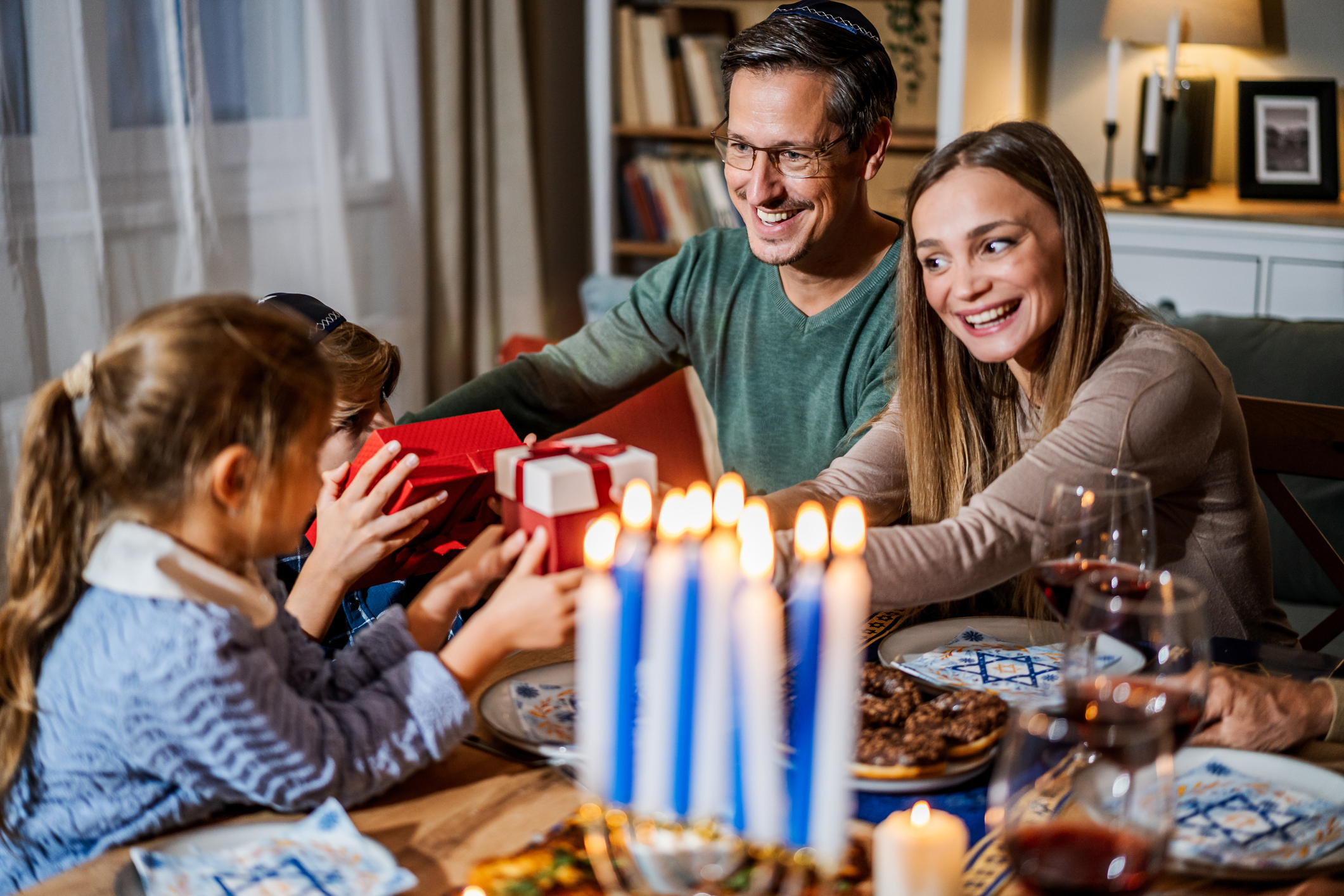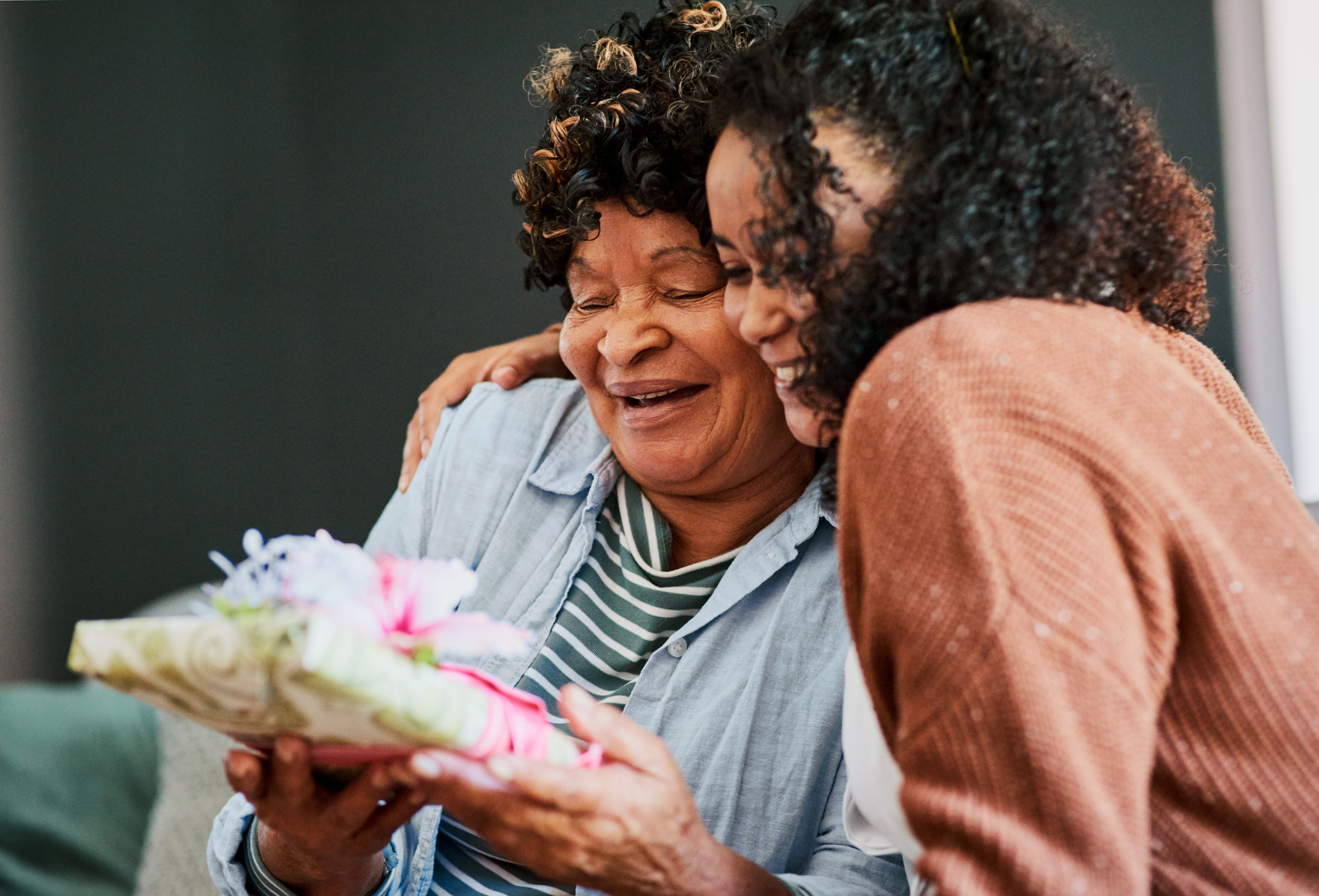Don't Waste Your Money on Bad Gifts. Try This Instead.
These strategies, backed by behavioral finance, can help you find presents that your loved ones will truly enjoy.


Profit and prosper with the best of Kiplinger's advice on investing, taxes, retirement, personal finance and much more. Delivered daily. Enter your email in the box and click Sign Me Up.
You are now subscribed
Your newsletter sign-up was successful
Want to add more newsletters?

Delivered daily
Kiplinger Today
Profit and prosper with the best of Kiplinger's advice on investing, taxes, retirement, personal finance and much more delivered daily. Smart money moves start here.

Sent five days a week
Kiplinger A Step Ahead
Get practical help to make better financial decisions in your everyday life, from spending to savings on top deals.

Delivered daily
Kiplinger Closing Bell
Get today's biggest financial and investing headlines delivered to your inbox every day the U.S. stock market is open.

Sent twice a week
Kiplinger Adviser Intel
Financial pros across the country share best practices and fresh tactics to preserve and grow your wealth.

Delivered weekly
Kiplinger Tax Tips
Trim your federal and state tax bills with practical tax-planning and tax-cutting strategies.

Sent twice a week
Kiplinger Retirement Tips
Your twice-a-week guide to planning and enjoying a financially secure and richly rewarding retirement

Sent bimonthly.
Kiplinger Adviser Angle
Insights for advisers, wealth managers and other financial professionals.

Sent twice a week
Kiplinger Investing Weekly
Your twice-a-week roundup of promising stocks, funds, companies and industries you should consider, ones you should avoid, and why.

Sent weekly for six weeks
Kiplinger Invest for Retirement
Your step-by-step six-part series on how to invest for retirement, from devising a successful strategy to exactly which investments to choose.
It may be better to give than to receive, but that doesn't make picking out holiday presents for your family and friends any easier. Even with all the festive cheer that the season brings, it can be stressful to shop for the perfect gift for everyone on your list if you're worried the folks you hold near and dear won't be delighted by what they find under the tree.
With gift givers spending more than ever, that pressure is mounting. In 2024, U.S. consumers dropped a record $994 billion on holiday shopping, according to the National Retail Federation, and projections by the Mastercard Economic Institute suggest holiday sales will continue to climb this year, by an estimated 3.6%. Higher-income shoppers, buoyed by a surging stock market, are likely to spend even more.
Shelling out bigger bucks, though, doesn't necessarily yield better gifts for the people you love. The NRF says holiday returns last year were 17% higher than average, suggesting a growing number of presents are missing the mark, putting added pressure on gift givers this year.
From just $107.88 $24.99 for Kiplinger Personal Finance
Become a smarter, better informed investor. Subscribe from just $107.88 $24.99, plus get up to 4 Special Issues

Sign up for Kiplinger’s Free Newsletters
Profit and prosper with the best of expert advice on investing, taxes, retirement, personal finance and more - straight to your e-mail.
Profit and prosper with the best of expert advice - straight to your e-mail.
"We give gifts because we want to make people happy, give them something they'll enjoy and signal we care about them," says Elanor Williams, an associate professor of marketing at Washington University and a leading gifting researcher. "And therefore we stress about it."
How can you reduce that anxiety and land on gifts the people you care about will love? Science can help.
A growing body of research from behavioral finance experts identifies the kinds of presents that people typically like best and the mental quirks that prevent many people from buying them. Understanding these preferences and the cognitive traps that lead gift givers astray can help ensure your holiday presents not only stand out when they're unwrapped but also stand the test of time.
These are the strategies that leading researchers in the field suggest.
Skip the razzle-dazzle
Have you ever splurged on gifts for your family that made them exclaim in delight upon opening, only to never see the items used or played with again? You may have fallen victim to the smile-seeking hypothesis.
Coined by researchers at the National University of Singapore and the University of Chicago Booth School of Business, the term refers to the tendency of gift givers to focus on eliciting the biggest reaction at the time a present is opened — a big smile or expression of awe — rather than on whether the item will bring your recipient long-term satisfaction when he or she actually uses it in the future.
The researchers ran several experiments to test the hypothesis, including one in which they randomly assigned participants to give or receive one of two similarly priced mug sets as a wedding present: an award-winning ergonomic set or a personalized set with inscriptions of the couple's names and wedding date.
Gift givers favored the more personal mugs and predicted the newlyweds would have a more positive reaction to them when opened and like them more over the long term, too. In reality, the recipients preferred the more useful mugs, both at the moment of unwrapping and for use over time.

"There's so much pageantry that goes along with exchanging gifts, especially at Christmas," says Williams. "It really gets you focused on that moment where you're going to hand that gift over and see what the person says when they open it."
What to do instead? Rather than try to wow loved ones when you give them a holiday gift, focus on whether your kids, grandkids and dear Uncle Bill really need the item and will use it and like it in the days and weeks to come.
Research shows, says Cindy Chan, an associate professor of marketing at the University of Toronto, that recipients are often just as happy, if not happier, to open practical gifts as they are showstoppers, valuing a seemingly boring gift more because they get more use out of it.
"For my parents and their stockings one Christmas, I just threw in some kitchen utensils," Chan says. "I noticed that their kitchen tongs were really annoying, that their ladle was starting to crack. They use them every day, and they appreciate that gift."
Gift them what they want
One of the simplest ways to get everyone on your list something they will enjoy is to put yourself in their shoes, says Mary Steffel, associate professor of marketing at Northeastern University who has published multiple research papers on the psychology of gift giving.
"Try to think about what that person might choose for themselves, and let that help guide your decision," Steffel says. "That's more likely to keep our focus on the recipient's preferences as opposed to other motives, like our desire to feel thoughtful."
The easiest way to do this? Buy something from your recipients' wish list. Studies suggest your loved ones will appreciate that gift more than an unsolicited surprise offering and consider it more thoughtful, even if it doesn't feel that way to you.

That was the conclusion of a study out of Harvard Business School and Stanford University's Graduate School of Business. In one experiment, the researchers gave gifters the option to pick a present from their recipient's Amazon wish list or choose one on their own. People were more satisfied when they received gifts from their list — just as, in other experiments, they preferred to get wedding gifts from their registry and birthday gifts they had explicitly requested.
Still, gifters love to go rogue. Why the disconnect? The researchers concluded that people giving presents mistakenly believe it makes them look more considerate when they think up gift ideas for someone on their own, though the opposite is true.
"We want to feel thoughtful. We want to communicate, I want to show you how well I know you," says Julian Givi, associate professor of marketing at West Virginia University and a leading gifting researcher. In reality, he says, these are unconsciously selfish motivations because they don't put what the recipient really wants first.
Don't get too personal
You may think that a highly personal gift will signal how well you know the unique tastes and preferences of your friends and relatives. But a series of studies spearheaded by Northeastern University's Steffel and Washington University's Williams show how these kinds of presents can backfire.
In one experiment, the researchers randomly assigned participants to imagine that they were either giving a gift to a close friend or receiving one from that pal. They were then presented with two gift options: a Visa gift card that could be used anywhere or a gift card from the recipient's favorite clothing store. As it turned out, givers were far more likely to choose a gift card to the recipient's favorite store, but the people getting the present preferred the more versatile Visa gift card.

Steffel and Williams's research also finds that you are more likely to choose a personalized, less versatile gift for someone you're close to — say, a child or sibling — than people with whom you have a more distant relationship because you think it signals how well you know the recipient. Ironically, you could be giving the people you love worse presents than your acquaintances.
Buying your daughter a gift card to a store you know she's purchased clothes from before shows you are paying attention, but it doesn't take into account all the other facets of her personality, Steffel says. Clothes might not be first on her wish list.
"Givers tend to pick something that is representative of who their recipient is," she says. "Recipients are more likely to focus on what they want or need right now, so gravitate toward a gift that's more flexible."
Play the hits
You also don't have to bend over backward to give everyone a different present, even if the gifts will be opened at the same holiday gathering. If you've landed on a winner — say, Labubus for the grandkids or Amazon gift cards for the adults — go with it.
Steffel and Robyn LeBoeuf, professor of marketing at Washington University, tested that strategy in a series of experiments. In one, the researchers invited college students to get a jump on holiday shopping by giving either one or two friends a $25 gift card; in the two-friend scenario, only one of the recipients was a student at the giver's school. The gift-card choices were Amazon (established in pre-testing as the one people would likely want most), the university bookstore or a sporting goods store.

When giving a present to their fellow student alone, 72% of gifters chose the Amazon card while 24% picked the bookstore. For two friends, 81% picked the Amazon card for the person who didn't attend their school, and the number giving the university bookstore card to the college pal jumped to 43%.
Other experiments established the likely reason was to appear thoughtful by choosing a uniquely suitable gift — even one that might not be enjoyed as much.
"Givers may be overthinking it," Steffel says. "You really should be giving people the thing that you think they're going to like the most, even if it is a duplicate of something you're giving somebody else."
Favor experiences over stuff
Gifts of experiences — say, a gift card to a favorite restaurant or tickets to a play or ballgame — are likely to bring you closer to your loved ones than material gifts, studies show. So think about what the people on your holiday list enjoy doing in their spare time and how you might tailor a gift to their preferred activities, suggests Chan.
Her research, conducted with Cassie Mogilner, a professor of marketing and behavioral decision-making at the University of California, Los Angeles, looked at how different types of presents affect the relationship between giver and receiver. In one experiment, university students were recruited with a friend, with one from each pair randomly assigned to be the giver while the other was the receiver. Givers could purchase either a $15 experiential gift or a $15 material gift, and recipients rated the strength of their friendship with the giver before and after getting the present.
The researchers found that recipients rated the experiential gifts as far more effective at improving the relationship — even when the experience wasn't something the friends could do together.
This is because experiences elicit a stronger emotional response than purely material gifts do, Chan says. It's not so much that the person getting the gift likes it more; rather, it makes her feel closer to the giver when she consumes it.

"Experiential gifts tend to be more emotionally intense and more emotionally evocative, and this has a spillover effect on making the relationship stronger," Chan says.
You can also mix a material gift with an experience for greater impact. Rather than buy your coffee-connoisseur son a gift card to a local java joint, for example, you could present him with a bag of coffee beans and a mug with a heartfelt note saying you hope he will savor them before work. When your son has his first sip each morning, he will think of you fondly.
"It's very different to say 'Here's a mug, I hope you love it,' than 'Here's a mug, I hope it brings you a moment of calmness in your busy day,' " says Chan. "You will feel differently about that mug."
Don't overthink it, though. No matter what you give your loved ones for the holidays, Chan says, they're likely to appreciate the gesture. "People talk about bad gifts, but really, really bad gifts are not the norm," she says. In the end, she notes, "most gifts are well liked."
Note: This item first appeared in Kiplinger Personal Finance Magazine, a monthly, trustworthy source of advice and guidance. Subscribe to help you make more money and keep more of the money you make here.
Related Content
Profit and prosper with the best of Kiplinger's advice on investing, taxes, retirement, personal finance and much more. Delivered daily. Enter your email in the box and click Sign Me Up.

Alicia Adamczyk is a business and personal finance journalist whose work has been featured in Fortune, CNBC, The Washington Post, Money, Forbes, and USA Today. She has written about retirement planning, investing, taxes, student loans and more for over a decade, and is currently a senior editor for The Purse, where she tells women’s money stories.
-
 Quiz: Do You Know How to Avoid the "Medigap Trap?"
Quiz: Do You Know How to Avoid the "Medigap Trap?"Quiz Test your basic knowledge of the "Medigap Trap" in our quick quiz.
-
 5 Top Tax-Efficient Mutual Funds for Smarter Investing
5 Top Tax-Efficient Mutual Funds for Smarter InvestingMutual funds are many things, but "tax-friendly" usually isn't one of them. These are the exceptions.
-
 AI Sparks Existential Crisis for Software Stocks
AI Sparks Existential Crisis for Software StocksThe Kiplinger Letter Fears that SaaS subscription software could be rendered obsolete by artificial intelligence make investors jittery.
-
 One of the Most Powerful Wealth-Building Moves a Woman Can Make: A Midcareer Pivot
One of the Most Powerful Wealth-Building Moves a Woman Can Make: A Midcareer PivotIf it feels like you can't sustain what you're doing for the next 20 years, it's time for an honest look at what's draining you and what energizes you.
-
 I'm a Wealth Adviser Obsessed With Mahjong: Here Are 8 Ways It Can Teach Us How to Manage Our Money
I'm a Wealth Adviser Obsessed With Mahjong: Here Are 8 Ways It Can Teach Us How to Manage Our MoneyThis increasingly popular Chinese game can teach us not only how to help manage our money but also how important it is to connect with other people.
-
 Looking for a Financial Book That Won't Put Your Young Adult to Sleep? This One Makes 'Cents'
Looking for a Financial Book That Won't Put Your Young Adult to Sleep? This One Makes 'Cents'"Wealth Your Way" by Cosmo DeStefano offers a highly accessible guide for young adults and their parents on building wealth through simple, consistent habits.
-
 My Spouse and I Are Saving Money for a Down Payment on a House. Which Savings Account is the Best Way to Reach Our Goal?
My Spouse and I Are Saving Money for a Down Payment on a House. Which Savings Account is the Best Way to Reach Our Goal?Learn how timing matters when it comes to choosing the right account.
-
 We're 78 and Want to Use Our 2026 RMD to Treat Our Kids and Grandkids to a Vacation. How Should We Approach This?
We're 78 and Want to Use Our 2026 RMD to Treat Our Kids and Grandkids to a Vacation. How Should We Approach This?An extended family vacation can be a fun and bonding experience if planned well. Here are tips from travel experts.
-
 My First $1 Million: Retired From Real Estate, 75, San Francisco
My First $1 Million: Retired From Real Estate, 75, San FranciscoEver wonder how someone who's made a million dollars or more did it? Kiplinger's My First $1 Million series uncovers the answers.
-
 To Love, Honor and Make Financial Decisions as Equal Partners
To Love, Honor and Make Financial Decisions as Equal PartnersEnsuring both partners are engaged in financial decisions isn't just about fairness — it's a risk-management strategy that protects against costly crises.
-
 Top 5 Career Lessons From the 2026 Winter Olympics (So Far)
Top 5 Career Lessons From the 2026 Winter Olympics (So Far)Five lessons to learn from the 2026 Winter Olympics for your career and finances.